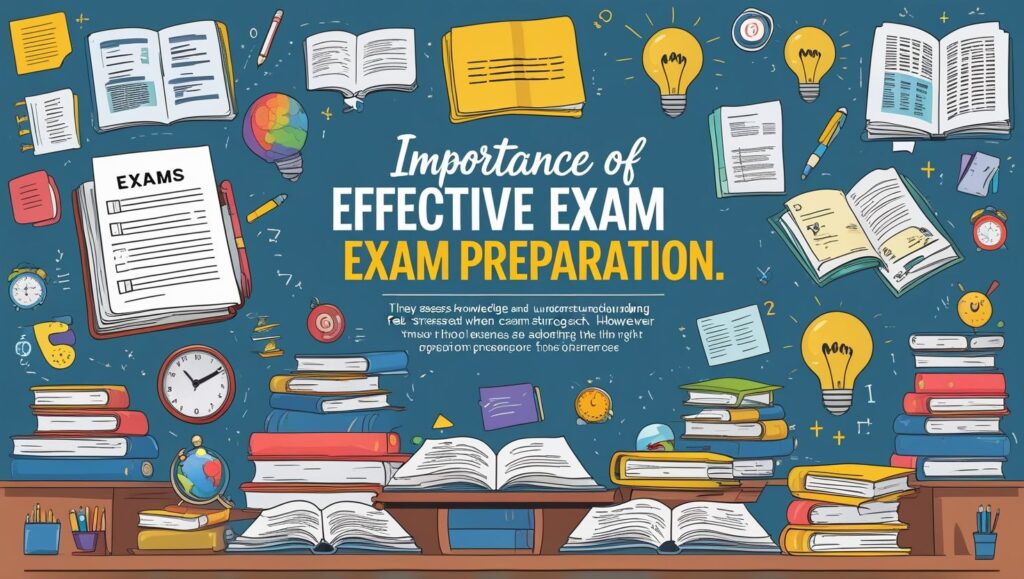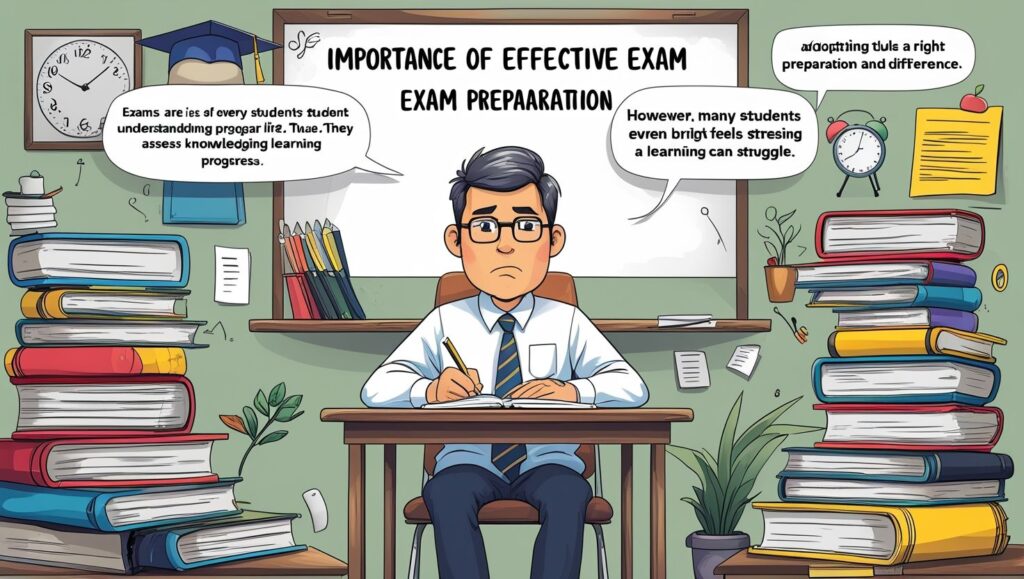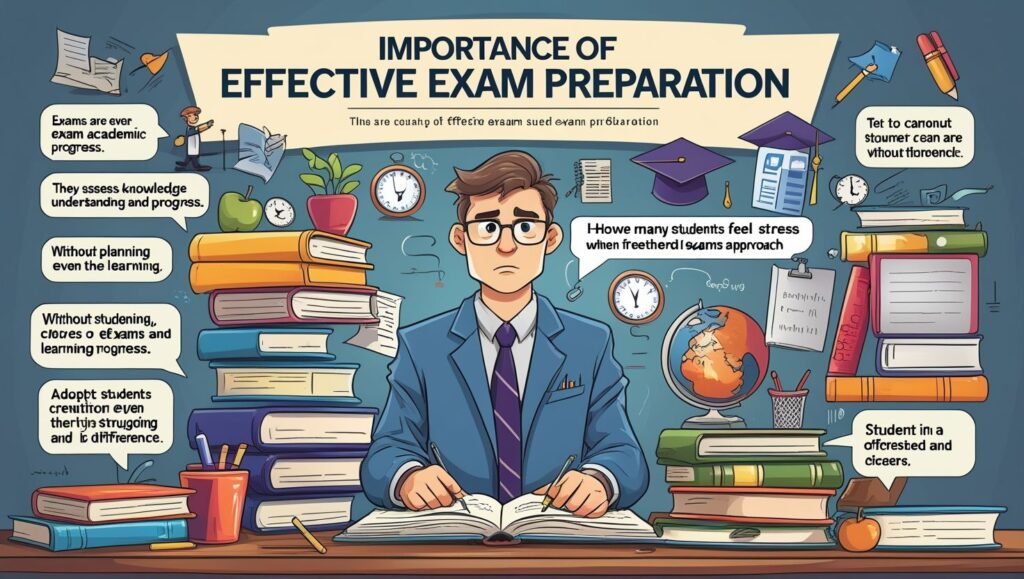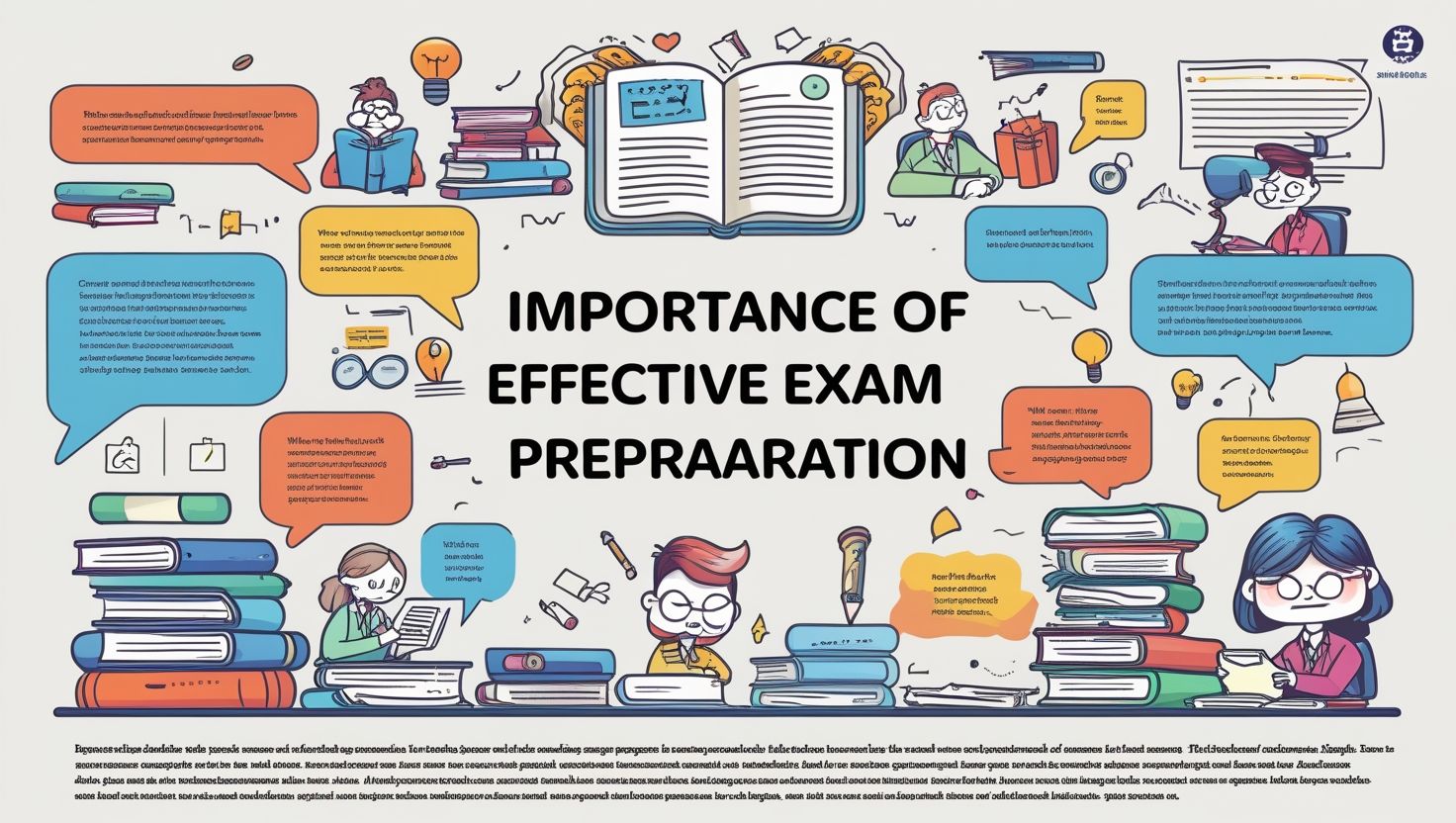Introduction:
Importance of Effective Exam Preparation, Exams are crucial in every student’s academic life. They assess knowledge, understanding, and learning progress. Therefore, preparing effectively is essential. However, many students feel stressed when exams approach. Without planning, even bright learners can struggle. Thus, adopting the right preparation methods makes a big difference.
First of all, preparation helps build confidence. It reduces anxiety and improves performance. Students who plan early often feel more relaxed. Additionally, proper study techniques lead to better time management. Instead of cramming, they study in small, manageable sessions.
Moreover, effective preparation is not just about reading books. It involves revision, note-making, testing, and self-evaluation. These strategies help retain information. They also train the brain to recall faster under pressure.
Besides, preparation habits teach valuable life skills. Students learn discipline, responsibility, and organization. These traits help not only in exams but also in future careers.
In conclusion, exams may be stressful, but preparation reduces that pressure. With consistent effort, smart strategies, and the right mindset, any student can succeed. This guide outlines practical steps to prepare for exams with confidence, focus, and efficiency. By following these, students can perform better and feel more in control during exam season.
Creating a Realistic Study Plan
A study plan is the foundation of successful exam preparation. It provides structure and direction. Without a plan, time gets wasted and subjects may be skipped. Therefore, planning your study schedule early makes a big difference.
To begin with, review your syllabus. Divide it into topics and assign them to specific days. Include all subjects and allow more time for difficult ones. Additionally, break your day into small study blocks. For instance, study for 45 minutes, then take a 15-minute break.
Moreover, be realistic. Don’t try to study too much in one day. Overloading your brain can lead to burnout. Instead, set small goals and stick to them. This builds a habit of discipline.
Furthermore, include revision sessions in your plan. Don’t wait until the last moment to review. Revisiting topics strengthens memory and understanding.
Also, use planners or calendars. Mark important dates, such as tests and deadlines. Seeing your plan visually helps track progress and stay motivated.
In summary, a well-structured study plan brings clarity and focus. It ensures that every topic gets proper attention. Although making a schedule takes time, the benefits are long-lasting. With a good plan, success becomes much more achievable.

Choosing the Right Study Environment
The place where you study affects your concentration and productivity. Therefore, selecting the right environment is very important. A quiet, clean, and comfortable setting makes studying easier. On the other hand, distractions can ruin focus and waste time.
Firstly, avoid noisy areas. Background sounds like TV or loud music reduce attention. Choose a spot where you can sit upright, such as a desk or table. Also, make sure the lighting is bright enough. Dim light causes eye strain and makes you sleepy.
Moreover, keep your study area organized. A cluttered space leads to a cluttered mind. Arrange your books, notes, and stationery neatly. This saves time and keeps you calm. Furthermore, remove digital distractions. Unless you’re using it for learning, keep your phone away. Social media and games can easily steal your focus.
Additionally, personalize your space. Use motivational quotes, a study lamp, or a small plant. These add positivity and comfort. In conclusion, a good study environment boosts concentration and efficiency. It makes long study hours more manageable. By minimizing distractions and creating a focused setting, students improve their learning outcomes. Hence, choosing the right place is a crucial step in exam preparation.
Mastering Time Management Skills
Time management is the key to exam success. It helps you cover the syllabus without stress. If you use time wisely, you reduce the need for last-minute cramming. Therefore, learning to manage your hours efficiently is essential.
To start with, prioritize your subjects. Focus on the areas you find difficult. Spend more time on those and revise the easier ones quickly. Also, set specific goals for each study session. For example, decide to complete two chapters within two hours. Moreover, use techniques like the Pomodoro method. Study for 25 minutes and take a 5-minute break. After four sessions, take a longer break. This keeps your brain fresh and helps avoid fatigue.
Furthermore, avoid multitasking. Doing many things at once lowers efficiency. Focus on one subject or topic at a time. Additionally, avoid procrastination. Delaying tasks builds pressure and affects quality. Also, keep a daily checklist. Crossing off tasks gives a sense of achievement. It motivates you to stay on track.
In summary, managing time effectively makes studying smoother. It allows for balance, rest, and revision. By staying disciplined and planning wisely, students can prepare confidently. Time, if used well, becomes a powerful tool in exam preparation.
Effective Note-Taking Techniques
Good notes are essential for revision. They save time and make studying more effective. Rather than reading entire textbooks again, notes give a quick summary. Therefore, learning how to take useful notes is very important.
Firstly, avoid writing everything word-for-word. Instead, focus on key points and main ideas. Use bullet points, headings, and subheadings. These help organize information clearly. Additionally, highlight important terms or formulas. This makes them easy to locate later.
Moreover, try different note-taking methods. The Cornell Method, mind maps, and flowcharts are useful. Each method suits different topics. For example, mind maps work well for science and history. They show connections between ideas.
Also, write notes in your own words. This helps you understand better. Copying directly from the book does not help retention. When you rephrase, your brain processes the information more deeply. Furthermore, review and update your notes regularly. Add new points during class or while revising. This makes your notes more complete.
In conclusion, effective note-taking saves effort and improves learning. It keeps information organized, easy to recall, and ready for last-minute revision. With the right technique, your notes become your best revision companion during exams.

Using Practice Tests and Past Papers
Practice tests are powerful tools in exam preparation. They help students understand the exam format and test their knowledge. Solving past papers also improves speed and accuracy. Therefore, using these materials is a smart strategy.
Firstly, practice tests reveal your strengths and weaknesses. After finishing a test, check your answers. This shows which topics need more revision. Additionally, timed practice improves your exam timing. You learn how to manage limited time under pressure.
Moreover, past papers show repeated questions and common patterns. These give hints on what to expect. Practicing them helps reduce surprises during the actual exam. Furthermore, mock tests simulate real exam conditions. Sit in a quiet room and complete the paper without help. This builds exam stamina and reduces fear.
Also, analyzing mistakes is crucial. Don’t just mark your score. Look at wrong answers and understand why they were incorrect. This turns errors into learning opportunities. In summary, practice papers are essential for thorough preparation. They boost confidence, highlight gaps, and sharpen exam skills. Although they may seem challenging at first, regular practice brings major improvement. Students who use this technique usually perform better in real exams.
Developing Healthy Study Habits
Healthy habits are vital during exam preparation. They keep your mind sharp and body active. Studying without caring for health can cause burnout. Therefore, balancing study with wellness is essential for success. To begin with, eat nutritious food. Avoid junk snacks and sugary drinks. Instead, choose fruits, nuts, and water. Good nutrition fuels the brain and improves memory.
Moreover, sleep is important. Don’t sacrifice rest for study. Lack of sleep affects focus and decision-making. At least 7–8 hours of sleep is necessary, especially before exams. Additionally, include exercise in your routine. Even 20 minutes of walking or stretching helps. It improves blood flow and reduces stress. A healthy body supports a healthy mind.
Also, take regular breaks. Studying nonstop reduces effectiveness. Short pauses refresh the brain and improve attention. Furthermore, stay mentally healthy. Talk to someone if you feel anxious. Meditation or deep breathing helps calm the mind. Music or hobbies can also relax you.
In conclusion, healthy habits support academic success. When your body and mind feel good, studying becomes easier. Don’t ignore your well-being while chasing high scores. Health and preparation must go hand in hand for the best results.
Managing Exam Stress and Anxiety
Exam stress is common among students. However, too much anxiety affects performance. Managing stress is essential for staying calm and focused. Fortunately, many simple techniques can help reduce pressure. Firstly, start early. Last-minute preparation creates panic. With a steady study routine, stress decreases. You feel more prepared and confident. Also, avoid comparing yourself with others. Everyone learns at their own pace.
Moreover, practice relaxation methods. Deep breathing, meditation, or light stretching helps. These calm the nervous system and reduce anxiety. Listening to music or taking short walks can also relieve tension. Additionally, positive thinking matters. Replace negative thoughts with affirmations like “I am prepared” or “I will do my best.” This boosts self-esteem and helps you stay optimistic.
Furthermore, organize your study material. Clutter adds to stress. Keep books, notes, and pens in order. Also, set achievable daily goals. Completing tasks step-by-step feels rewarding. Lastly, talk to someone. Share your worries with parents, teachers, or friends. Getting support often makes problems seem smaller. In summary, stress can be managed with the right mindset and techniques. Stay calm, stay focused, and believe in your preparation. Peace of mind, along with effort, leads to exam success.

The Night Before and Day of the Exam
The final hours before an exam are crucial. What you do the night before and on exam day affects your performance. Therefore, having a plan for these moments is important. To begin with, revise lightly the night before. Don’t try to study new topics. Instead, go through summaries, formulas, or key points. Avoid overloading your brain. Also, pack your bag early. Include pens, ID cards, calculators, and snacks.
Moreover, get good sleep. Don’t stay up late. A rested mind works faster and remembers better. Eat a light dinner, relax, and avoid screens before bed. On exam day, wake up early. Have a healthy breakfast to fuel your energy. Avoid heavy or greasy food. Stay hydrated but don’t overdrink.
Additionally, reach the exam center early. Being late adds unnecessary panic. Once there, avoid discussing the paper with others. This can confuse or distract you. Before the exam begins, take a few deep breaths. Read instructions carefully. Manage your time wisely. If a question is difficult, move on and return later.
In conclusion, staying calm and prepared ensures a smooth exam experience. The final hours matter as much as the weeks of preparation. With a steady mind, you’re ready to succeed.
Conclusion:
Success in exams doesn’t come from luck. It comes from consistent preparation, smart strategies, and a calm mind. Throughout this guide, we’ve explored the key steps to effective exam preparation. Each step plays a role in achieving your best performance.
Firstly, planning your study time and environment creates a strong base. With structure, distractions reduce, and focus improves. Secondly, taking good notes and practicing with past papers builds knowledge. These strategies make revision faster and deeper.
Moreover, managing time wisely and caring for your health supports long-term performance. A healthy body and rested mind work better. Alongside this, stress management keeps anxiety under control. Confidence grows when you prepare well and think positively. In addition, what you do in the final hours before the exam also matters. Staying calm, sleeping well, and reaching early all contribute to success.
In the end, preparation is not about working the hardest—it’s about working the smartest. With focus, effort, and balance, exam success becomes reachable. Every student has the potential to shine. By following this guide, you take control of your learning and move one step closer to your goals.

sr5j0w
yoms9x
bl195e
futo6g
I like this site so much, saved to my bookmarks.
Excellent site. A lot of helpful information here. I am sending it to a few buddies ans also sharing in delicious. And of course, thanks in your sweat!
Fantastic website. A lot of useful information here. I am sending it to a few pals ans also sharing in delicious. And obviously, thanks in your sweat!
I was recommended this blog by my cousin. I’m not sure whether this post is written by him as no one else know such detailed about my difficulty. You are wonderful! Thanks!
Appreciating the persistence you put into your blog and in depth information you provide. It’s good to come across a blog every once in a while that isn’t the same outdated rehashed information. Fantastic read! I’ve saved your site and I’m including your RSS feeds to my Google account.